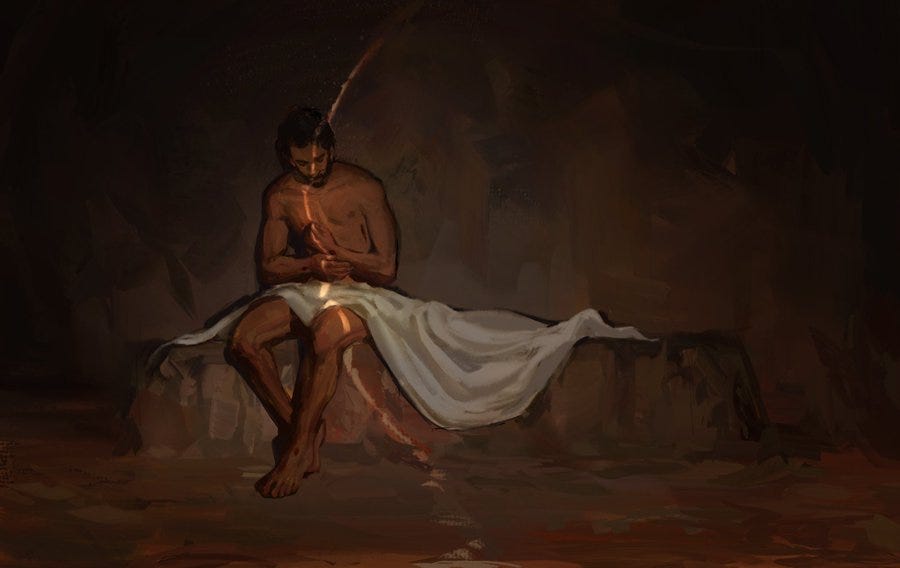“Peter got up and ran to the tomb,
bent down, and saw the burial cloths alone;
then he went home amazed.”

Gospel: Luke 24:1-12
Often, the greatest suffering comes from going through something painful alone.
I remember the depression I fell into as a novice in a Carmelite monastery. I wasn’t alone there, but I felt utterly isolated. I couldn’t be myself with anyone around me, and I was trapped in a terrible tension: feeling like God had called me there, wanting to erase the parts of myself I hated and feared in order to become someone holy, someone lovable... and at the same time, desperately wanting to leave. But even considering that felt like it would be unfaithful, unholy, a betrayal of my vocation.
That’s the kind of pain that lives right beneath the surface for so many of us, especially queer Catholics. Do you recognize it? The pain of silence. The ache of hiding. The fear that if we were ever really seen, we’d be rejected, not only by the people around us, but by God.
And into that pain—into the very heart of it—comes the shock of the Resurrection.
The good news of Easter Sunday is not just that Jesus rose from the dead. In fact, resurrection is a bit of a bore until we understand what it really means that He died. Jesus hurled himself into death like a diver into a deep sea trench: not just biological death, but the death of being misunderstood, the death of shame, of isolation, abandonment, despair.
He went all the way down, until he touched the depths of human misery…
And then He broke it open from the inside, turned it inside out, and by His very presence there, rewrote the whole story in a radical way.
James Alison says that Jesus “occupied the space of shame and curse” for us. Why? It certainly wasn’t to shame us further, not to accuse us or condemn us. No, he went all the way down into the depths of death in order to redeem them, to “detoxify” them: to hold all those painful places in love so tenderly that we would never again have to be afraid of them.
And dear friends, that includes whatever parts of you that you’ve been told are bad, shameful, or unlovable.
For many LGBTQ+ Catholics, we’ve been told so often that our love is disordered, our desire is dangerous, and our belonging is conditional. We’ve internalized those lies. Our own souls become bitterly divided. But the Risen Christ is not the one whispering those things.
The truth is, our desire is not the problem. Our queerness is not a sin. God is not scandalized by the mystery of who you are. What keeps us bound and burdened is fear.
But what if the Resurrection means that Jesus has already been there, down in the depths of our fear and shame?
What if He didn’t wait for us to be ready to receive Him, to one day be clean enough, holy enough, good enough, but instead dove straight into the mess and the ache of our hiding places, the closet and the cross, and said, “My beloved one, I know. And I’m not afraid of who you are”?
For me, the truly good news of Easter is that our being sinners really isn’t a problem for God. It’s a problem for us. Sin is what happens when love gets blocked by fear, by shame or self-hatred. But Jesus walks confidently into those places in us that are blocked. He goes there, not begrudgingly, but as a friend. Not to accuse, but to heal. And He looks at us there, in the places of our greatest suffering and shame, as someone who really likes us, with a look of kindness, gentleness, and love.
Here’s what healing looks like in those places:
The stone is rolled away.
The love that was blocked in us is set free.
The tomb is empty.
And the place we were so afraid of, the place of our greatest suffering and shame, our grief, our deep loneliness, becomes a place of glory.
Jesus has been there, and He is not afraid.
So maybe we don’t need to be, either.
Reflection Questions:
Where in my life am I afraid to be seen? What would happen if I let myself be more fully known there?
What parts of myself have I been taught to hide or reject in order to be “holy”? What would it feel like to believe that God is not afraid of those places, but already delights in me there?
Can I name a place of suffering or shame in my story? Can I dare to believe that Jesus has already been there, and even now waits to meet me there with love?


